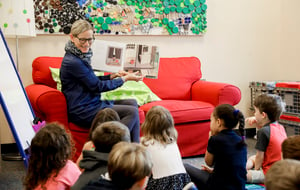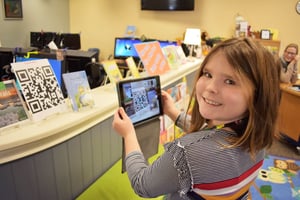 There’s no denying that reading is an essential skill for academic success, but the best part of my role as the librarian is showing students how much fun it is to immerse themselves in a good book. My strategies vary based on the age, reading level, and individual style of each student, but below are four of my favorite ways to get kids excited when they visit the library.
There’s no denying that reading is an essential skill for academic success, but the best part of my role as the librarian is showing students how much fun it is to immerse themselves in a good book. My strategies vary based on the age, reading level, and individual style of each student, but below are four of my favorite ways to get kids excited when they visit the library.
1. Make It Personal
Students are most excited about reading when they can find a connection to their own lives, so I make a point of getting to know each student well. In addition to the time spent in the library, I take note of the interactions that I have with each child when I’m teaching them in French class or watching them play during my recess duty. Knowing students across multiple contexts helps me understand the unique interests of each child so that I can suggest the perfect book.
I also work with homeroom teachers to create library displays that connect with the work that students are doing in their other classes. For example, when first-grade social studies classes learn about the continent of Africa, I do a read-aloud of The Giraffe That Walked to Paris, which tells the true story of the first giraffe that was brought from Africa to France. I then add that book to a display that includes books about French culture, North African cultures, and fictional stories like Giraffes Can’t Dance. Students are thrilled when they can put their background knowledge to work and choose a library book that relates to something else that they’re learning.
 2. Give It a Sneak Peek
2. Give It a Sneak Peek
To help the students get a feel for the book I put up Quick Response (QR) codes that link to book trailers for various titles. Using iPads, the children scan the QR codes and watch the video trailers to get a quick summary of the story. Students have fun watching videos and the children are better able to choose books that will engage them when they know more about the storyline.
3. Play A Game
Sometimes a little competition is just what kids need to get them motivated to read! I offer students a Book Bingo board that has the name of a different book genre (ex: historical fiction, poetry, graphic novel, fantasy, etc.) in each square. When students read a book that fits into that category they write down the title and the date they finished reading. Students earn a small prize when they get one full row and a larger prize if they complete every spot on the board.
4. Focus On Friends
I encourage students to talk to each other about what they’re reading, and one easy way to promote conversations is having the book return basket be open for viewing. When kids see their classmates returning a book it’s a great time to chat about what the reader thought of the story and whether they would recommend it. If I have multiple copies of a book I sometimes invite students to create a mini-book club so that a group of friends will be able to read and discuss the same book at the same time. In addition, I introduce students to books in a series as often as I can. If a child finds a character that they love then reading each book in the series is like going on an adventure with a literary friend.
Find Inspiration for Great books
Are you feeling inspired to dive into some great books with your kids? If so, take a look at this article from Parents magazine that lists 18 ways that parents can get their kids enthusiastic about reading









